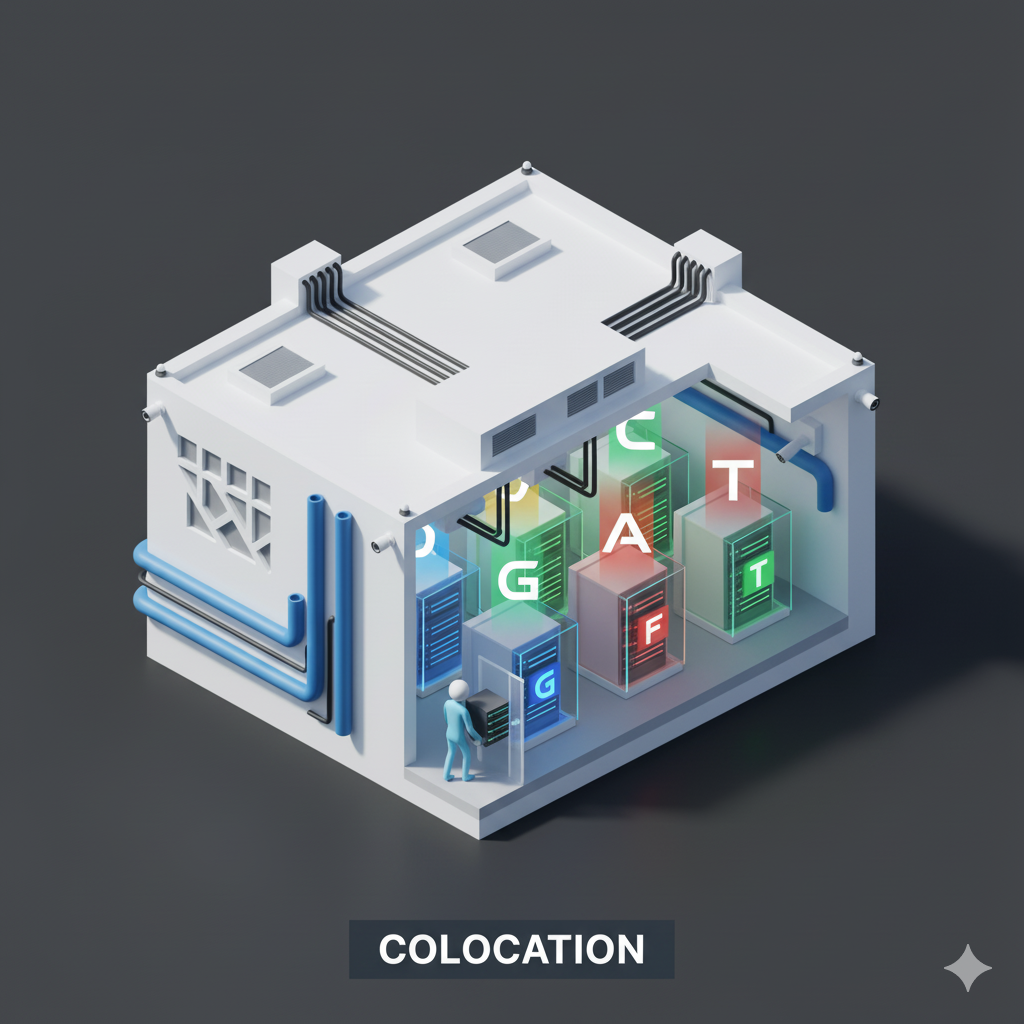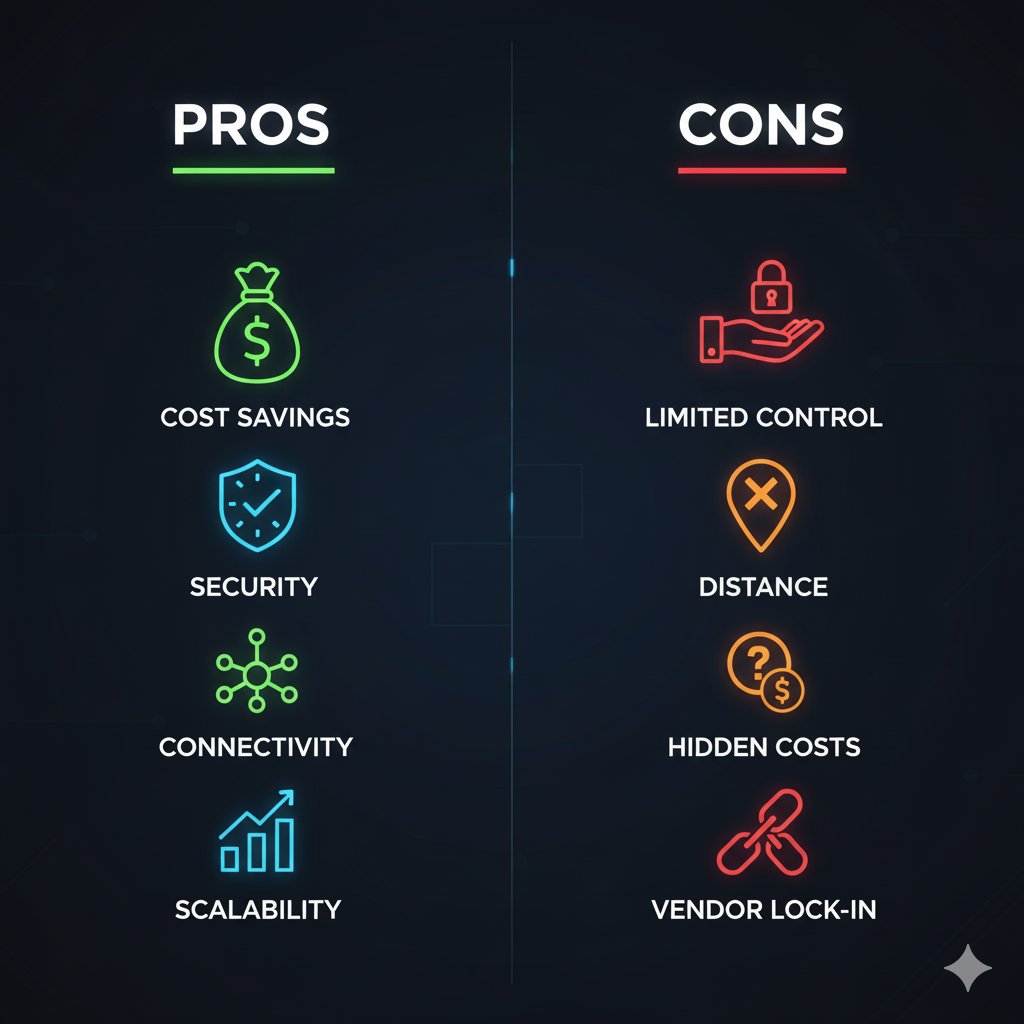Our digital world relies on immense amounts of data. Businesses generate and use this data constantly. Where does all this information live? It resides in specialized facilities called data centers. Building and managing your own data center can be complex. It requires huge investments. This leads many organizations to consider alternatives.
One popular option is data center colocation. But what is data center colocation exactly? It is a shared model for IT infrastructure. Companies rent space in a purpose-built data center. They bring their own equipment, like servers and storage. The colocation providers supply the rest. They manage the building, power, cooling, and security.
This guide explores the concept of colocation. We will look at its benefits and drawbacks. Understanding how colocation helps businesses make informed decisions. It can be a powerful colocation solution for various needs.
What is a Colocation Data Center?
Data center colocation involves renting physical space for your IT equipment. You place your servers, storage, and networking equipment within a third-party facility. This facility is owned and operated by colocation providers. These providers offer a secure colocation environment.
The colocation providers supply the essential infrastructure. This includes the building itself. They provide consistent power and robust cooling systems. They also manage network connectivity and physical security. You maintain ownership and management of your actual IT equipment. This differentiates colocation from other services. For more on the different types of data centers, check our related blog.
Businesses choose colocation for many reasons. They gain access to enterprise-grade data centers. They avoid the high costs of building their own. It offers a balance between control and outsourced management. This service allows organizations to focus on core operations. It ensures reliable uptime for their digital assets.

What are the Pros of Colocation Data Center?
Choosing a colocation data center offers numerous advantages. These benefits address common challenges. They help companies achieve better IT operations.
Cost Savings
Building a data center is very expensive. It requires huge capital investment. You need land, construction, and specialized equipment. Colocation eliminates these upfront costs. You only pay for the space and resources you use. This significantly reduces your financial burden. It makes enterprise-grade infrastructure accessible. You save money on maintenance too.
Enhanced Security
Colocation facilities prioritize physical security. They employ robust measures. This includes access control systems. They use video surveillance and security personnel. The colocation environment is highly protected. This level of security is hard to achieve in a typical office. Your equipment is safe from unauthorized access.
Increased Reliability and Uptime
Colocation providers build highly reliable data centers. They feature redundancy for key components. This includes power and cooling systems. They connect to multiple power grids. This ensures continuous availability. Many colocation centers meet stringent data center tiers certifications. This guarantees high uptime for your servers.
Superior Connectivity
Colocation facilities offer excellent network connectivity. They provide access to multiple carriers. This enables robust interconnection. You can choose your preferred network provider. This improves communication speed and reliability. Direct connections reduce latency. This is crucial for performance-sensitive workloads.
Scalability
Your business needs to change over time. Colocation offers great scalability. You can easily expand your space as needed. Add more servers or storage. You avoid costly upgrades to your own facility. This flexibility supports business growth. You pay only for what you consume.
Expert Management and Support
Colocation providers have specialized expertise. They manage the facility infrastructure. Their teams handle maintenance and repairs. Many offer remote hands service. This means trained staff can assist with your equipment. This support frees your IT team. They can focus on strategic tasks.
What are the Cons of Colocation Data Centers?
While colocation offers many benefits, it also has drawbacks. Businesses must consider these carefully. They impact control, cost, and logistics.
Limited Direct Control
You rent space, but not the entire facility. The colocation providers control the infrastructure. You manage your equipment. However, you cannot control environmental factors. Changes to cooling or power might be outside your direct influence. This shared colocation environment means less autonomy.
Distance and Access
Your equipment is off-site. Physical access requires travel. This can be inconvenient. Troubleshooting issues might take longer. While remote hands service helps, it is not always ideal. Choosing a colocation region close to your team is important. This minimizes travel time and costs.
Compliance and Regulations
Certain industries have strict regulations. You must ensure your colocation providers meet them. This includes industry-specific compliance standards. The provider’s security and operational procedures must align. Verifying this requires due diligence. It adds complexity to the selection process.
Vendor Lock-in
Moving equipment from one colocation facility to another is difficult. It involves significant effort and cost. This can lead to vendor lock-in. Changing colocation providers disrupts operations. Negotiate flexible service level agreements. Understand migration clauses clearly. This helps mitigate future challenges.
Potential for Hidden Costs
Initial pricing can seem attractive. However, scrutinize your service level agreements. Watch for additional charges. These might include cross-connect fees. Power usage exceeding limits can incur penalties. Extra remote hands service also costs more. Always clarify all potential fees upfront.

Making the Right Choice
Choosing the best data center strategy is crucial. Consider your business needs. Evaluate your budget carefully. Think about your desired level of control. Assess your security and compliance requirements.
A colocation solution often suits growing organizations. It provides enterprise-grade infrastructure. It avoids massive capital expenditures. It allows your IT team to focus. They can prioritize strategic initiatives.
Engage with potential colocation providers. Ask about their service level agreements. Inquire about their redundancy and physical security. Understand their network connectivity options. Make an informed decision. This ensures your data is safe and always available.
Conclusion
What is data center colocation? It is a powerful model. It allows businesses to host their IT equipment off-site. Colocation providers supply the necessary facility infrastructure. The pros of colocation data centers include cost savings and enhanced security. You gain increased reliability and superior connectivity. It also offers excellent scalability and expert management.
However, there are also cons of colocation data centers. These include limited direct control. Distance and access can be challenging. Compliance and regulations require careful review. Vendor lock-in and potential hidden costs exist. Weighing these factors helps organizations make the best choice. Colocation empowers many businesses. It provides a robust and efficient home for their vital data.
